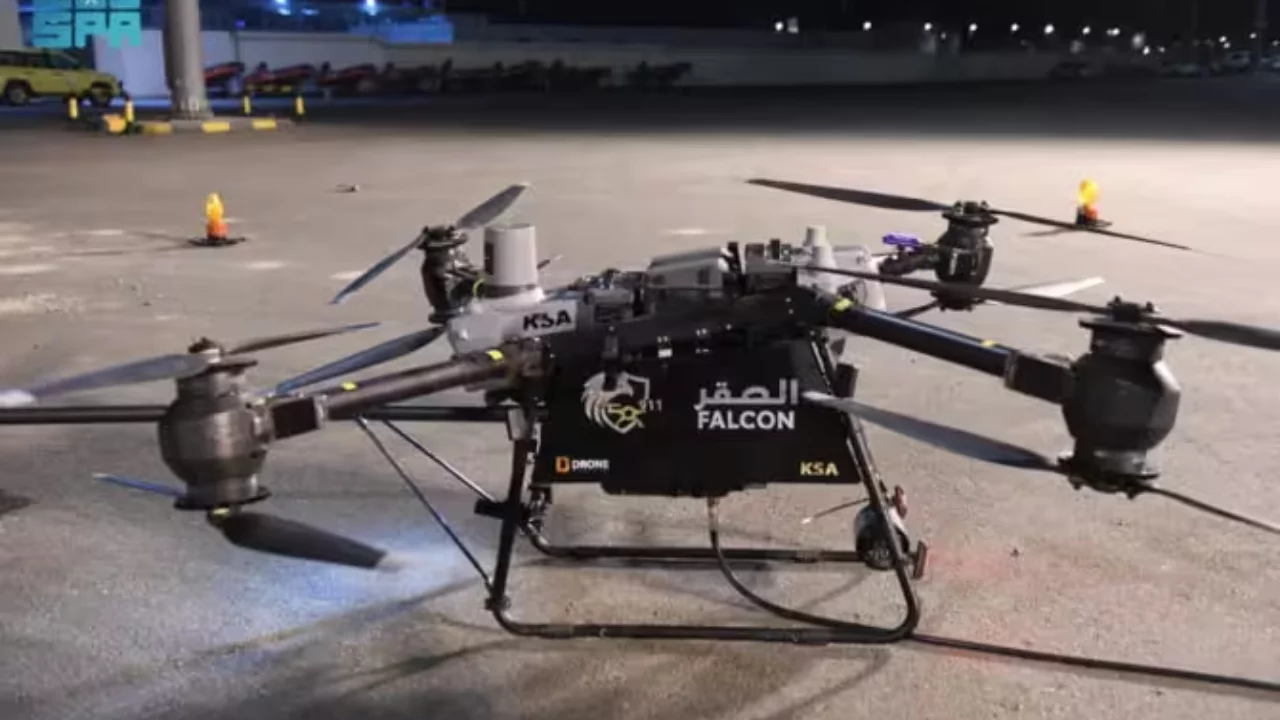Saudi Arabia has introduced an advanced artificial intelligence (AI)-powered drone system, named the “Falcon Drone,” to enhance surveillance and public safety during the Hajj 2025 pilgrimage. The new technology reflects the Kingdom’s broader push to integrate cutting-edge innovations into crowd management and security operations during one of the world’s largest annual religious gatherings.
Developed with a combination of AI, real-time data analytics, and autonomous flight capabilities, the Falcon Drone has been deployed to monitor key sites across Mecca and surrounding pilgrimage routes. Saudi officials say the system aims to ensure the safety of millions of worshippers, detect unusual activity, and respond rapidly to emergencies or security threats.
The General Authority for Artificial Intelligence and the Ministry of Interior collaborated on the initiative, positioning the Falcon Drone as a major technological advancement in crowd control. According to official sources, the drone can independently identify patterns of movement, track crowd density, and alert human operators to potential hazards, including overcrowding or suspicious behavior.
“The deployment of AI in real-time monitoring is not only a technological breakthrough but also a vital tool to protect pilgrims,” said a spokesperson from the Saudi Ministry of Interior. “The Falcon Drone provides high-altitude surveillance, precise visual feeds, and predictive analytics, allowing authorities to act quickly in critical situations.”
The system is also linked to centralized command centers where AI algorithms process the data collected and suggest pre-emptive measures. In case of emergencies, such as medical incidents or crowd surges, the drones can guide ground teams directly to the location using GPS and thermal imaging technology.
This year’s Hajj is expected to draw over two million pilgrims from around the world. With such high volumes, crowd safety has always been a significant challenge. The Kingdom has previously invested in smart technologies including facial recognition, e-bracelets for tracking pilgrims, and mobile apps for navigation and information services. The Falcon Drone adds a new layer of automated security coverage.
Security during Hajj has been a priority for Saudi Arabia following past tragedies involving stampedes and logistical failures. Authorities hope that AI will help preempt such incidents by improving situational awareness and enabling rapid response. “It’s a proactive shift from reaction-based security to prediction and prevention,” the official added.
Beyond security, the drones may also be used for logistical support, such as monitoring road congestion, managing the movement of buses and pilgrims, and even supporting sanitation efforts in key areas.
The initiative aligns with Saudi Arabia’s Vision 2030 strategy, which emphasizes the use of technology in public service modernization. The Kingdom has invested heavily in smart city infrastructure, AI development, and digital governance — positioning itself as a regional leader in tech-enabled administration.
Experts say that integrating AI into Hajj management could serve as a model for other large-scale events globally. “Saudi Arabia is setting a precedent by using autonomous systems in sensitive, high-density scenarios,” said Dr. Leila Hassan, a specialist in AI ethics and public technology. “If successful, it will reshape the global conversation about AI’s role in public safety.”
As the pilgrimage proceeds, Saudi authorities continue to monitor the performance of the Falcon Drone system. Feedback and operational data will reportedly be used to refine the technology ahead of future pilgrimages and other major events hosted in the Kingdom.
With technology now playing a central role in the spiritual journey of millions, the integration of AI reflects not just modernization, but also a heightened commitment to safeguarding one of Islam’s most sacred rites.
Source; Zamin.uz



